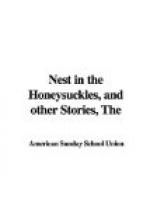When I saw them roving about in the high grass, seeking in vain to find their way to their mother’s presence, and hearing their calls for help, and her answering cry of distress, I could but think of the dear children who forget their mother’s counsel, and leave her protection before they are old enough to take care of themselves.
The ducklings, I observed, did not know who were their friends; for, one day, when the prettiest of the brood had found a way out of the rabbit-house, I thought I would catch it, and give it back to its mother. It was much alarmed, and Lily was in equal trouble. It ran away from me, thinking, perhaps that I was a greater enemy than the rats, against which it had probably been warned. Just as I was going to put my hand on it, it hid itself in a rat-hole, from which there was no escape. I could not rescue it, neither could its mother. The next morning, when I went to look at the ducks, and give them their breakfast, there lay the poor duckling, close by the fatal hole. The rat had brought it out, and partly devoured it.
Children often think they know what is best for them quite as well, if not better, than their parents, and when told not to do this or that, they are not satisfied to obey quietly, but ask, “Why not?” I think children may often be told why they are bidden to do this, or forbidden to do that; but they should obey their parents promptly, whether they know their reasons or not.
Sometimes there are reasons which children cannot understand, sometimes there are reasons which it would not be wise to tell them, and sometimes it is not convenient to give the why and the wherefore. Children are commanded to obey their parents,—not the reasons their parents may give them. The young ducks could not understand why their mother did not wish them to go out of that enclosure. They could not comprehend the dangers which surrounded them. They saw the birds flying about in the air, and heard the hum of the bees as they were going abroad for honey, or returning loaded to the hive, and they could not understand why they might not wander about too. The red clover looked very beautiful, and the white clover was so fragrant, they longed to ramble in it. They thought their mother unnecessarily strict, because she wished to keep them with her, instead of permitting them to see all the pretty things of which they could now and then catch a glimpse, as they peeped through the cracks of the rabbit-house.
Children sometimes feel unpleasantly because they are not permitted to play in the street. Ah! they are as ignorant of danger as the poor ducklings and they are too young to understand the peril to which they are exposed. Even if their mother should explain it to them, they could realize but little about it. It is by far the better way for children to feel that their mother knows best, and to be satisfied that her reasons are good and sufficient even if they do not know what they are.




